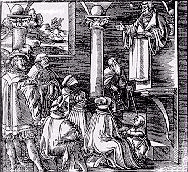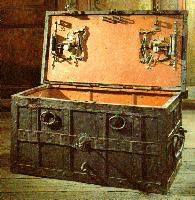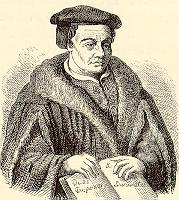Luther's Return to Wittenberg (1522-25)
Luther Returned to Wittenberg and took over the 'Scepter of the Reformation'
After the first iconoclastic movement in Wittenberg, Luther returned from exile. He even annulled some of the reformatory changes that he saw as dangerous because they would force people into a new belief which he did not want to do.
 Luther returned to Wittenberg on March 6, 1521 and with his 'fasting sermons' brought the Reformation movement fwhich he thought had gotten too radical back to his moderate line.
Luther returned to Wittenberg on March 6, 1521 and with his 'fasting sermons' brought the Reformation movement fwhich he thought had gotten too radical back to his moderate line.
The outlaw's return was dangerous, but the reformers achieved partial success as far as Luther's safety was concerned: the Second Imperial Diet of Nuremburg declared the banishment of Luther as unenforceable. In 1524, however, at the Third Imperial Diet of Nuremburg the banishment was renewed, but the Reformation had rooted itself so deeply by then, that it seemed unlikely that Luther would be arrested.
In the years that followed, Luther concentrated on spreading his beliefs through writings and sermons.
In the work Of the Worldly Authorities, and How Much Obedience one owes Them Luther formulated the basis for his political ethics. Luther's moderate outlook comes to the foreground once again.
From 1522-1524 Luther's preaching duties receive priority; he went on preaching trips throughout central Germany and during the fall of 1522 even preached in Erfurt and Weimar. Luther felt it was important to proclaim and illuminate the Gospel to the people.
With his writings On the Order of Worship and Formula missae Luther carried out his reforms in the worship service.
 A new order of social service was achieved with the use of a community money box: the social and educational responsibilites of the community were taken over by the income from the old church.
A new order of social service was achieved with the use of a community money box: the social and educational responsibilites of the community were taken over by the income from the old church.
The reform of the school system was one of the most important of Luther's duties. Some of the professors and students with their interpretations of Luther's teachings had and almost shut down schools completely. The Reformation, however, needed well-educated pastors, teachers and civil servants. In his work "To the Councilmen of all Cities within German Territories; Christian Schools Ought to be Kept Up" Luther stated that authorities are obligated to guarantee a good education for the youth.
Luther and the Peasants War
Once again the Reformation found new enemies, this time radicals within its own ranks, called Swarmers and Mobbing Spirits by Luther.

Thomas Münzer, priest and former follower of Luther became a leader of peasant uprisings in Central Germany in 1525 which had already flared up in southwest Germany in 1524. The peasants, who called on the power of Luther's teachings, demanded more just (economical) conditions, even if that meant the downfall of the authorities.
In his sermons, which he also held in the areas of unrest, Luther stood firm against using force; he only received refusals from the peasants who had hoped for his support. Luther nevertheless encouraged them to free themselves from the spiritual despotism of the authorities not from their economic or political influence.
From these experiences came the desolate work "Against the Murderous and Thieving Hordes of Peasants", which is still a controversial work.
The peasants were defeated on May 15 at the battle of Frankenhausen.